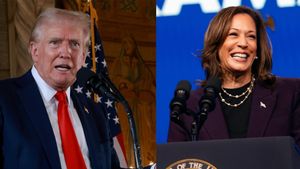A Chipotle shareholder has filed a class-action lawsuit against the fast-casual restaurant chain over allegations of inconsistent portion sizes, reflecting growing customer dissatisfaction and causing significant stock value fluctuations. This legal challenge follows widespread social media complaints about skimpy portions, sparking what has been dubbed "skimpflation"—a term for the trend where food portions shrink without prices dropping.
The proposed class-action suit was filed on November 11, 2024, and is backed by Robbins LLP, the law firm representing the shareholders. The lawsuit targets any individuals or entities who purchased Chipotle Mexican Grill, Inc. (NYSE: CMG) stock between February 8 and October 29, 2024, as well as those who engaged with specific options during the same timeframe.
At the heart of the lawsuit lies the claim the company misled investors about customer dissatisfaction levels concerning their portion sizes, which the suit describes as being "highly inconsistent." Notably, the discontent did not fully surface until early summer 2024 when social media outcry highlighted the issue. Food influencer Keith Lee, known for his substantial online following, escalated this when he criticized the chicken portions at Chipotle during a TikTok review earlier this May. His video went viral, prompting many customers to also share their grievances.
The timing of these revelations coincided with significant declines in Chipotle's stock value, as customers took to outlets like TikTok, Instagram, and Twitter to share pictures and videos of their meals, showcasing the inconsistency of portion sizes. This shift has not only led to widespread public discussion but also caught the attention of market analysts, including one from Wells Fargo, who conducted their own test by ordering 75 burrito bowls from Chipotle to evaluate the portion sizes firsthand. Their findings supported claims of drastic variations and inconsistency, adding credence to the public's outcries.
According to the lawsuit, the company's executives had initially downplayed the situation, arguing any issues did not pose significant harm to business operations. The plaintiffs assert this misrepresentation caused financial harm to investors by obscuring the truth about customer concerns, which Chipotle eventually acknowledged during its earnings calls. On July 24, 2024, during one of these calls, company representatives confessed to the inconsistency of portions, which played a role in customer dissatisfaction. Chipotle stated their commitment to investing in solutions for improving portion control, aiming to restore customer loyalty and transaction volumes.
"We are committed to making this investment to reinforce the message of generous portions and fresh food at fair prices," Chipotle's earnings call revealed. Nonetheless, this acknowledgment came coupled with the warning of increased cost pressures due to the need for larger portion sizes—a factor the defendants did not disclose to investors during the class period.
One notable moment came on October 29, when Chipotle's executives disclosed to investors during the Q3 earnings call, the reality of rising costs attributed to compensatory measures for responding to customer dissatisfaction over portion sizes. They detailed efforts to recalibrate their portion metrics, but this too resulted in increased cost of sales.
The lawsuit raises questions about whether Chipotle's executives acted with neglect concerning their reporting obligations to shareholders and if they adequately communicated the potential long-term impacts of this food quality controversy. It argues Chipotle’s failure to address these issues could have larger ramifications for customer loyalty and overall brand integrity.
According to Laurine Schalow, Chipotle’s Chief Corporate Affairs Officer, the company intends to vigorously defend its practices and operations. "We don’t comment on litigation and will vigorously defend our industry-leading real food," Schalow stated. This assertiveness is part of the corporate strategy to maintain stakeholder confidence amid rising scrutiny.
With the rising prevalence of "shrinkflation" across various sectors, customers have become increasingly vigilant about portion sizes and value for their money. This sentiment has permeated the fast-food industry, with consumers also calling out other chains like McDonald's for similar practices, such as size reductions without price adjustments.
Chipotle's current predicament reflects broader issues within the food industry, where rising operational costs have forced companies to make difficult choices, impacting customer satisfaction and, by extension, company profitability. The impacts of this lawsuit could reverberate beyond individual shareholders—it holds potential for significant lessons about transparency and integrity within the food service industry.
Shareholders involved with the lawsuit can opt to remain as absent class members if they choose not to partake directly in the litigation—however, there is encouragement for them to apply to represent the class through formal channels. The deadline for serving as lead plaintiff is set for January 10, 2025, highlighting the immediate nature of these legal proceedings.
This case marks another chapter for Chipotle as it navigates its customer relations amid scrutiny and challenges to its operational practices, with investor confidence hanging in the balance.



